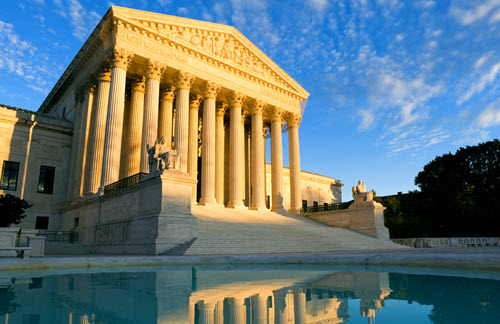
By: Cole A. Bauman | Intern| cole.bauman@procopio.com
In its May 20th, 2019 decision, Herrera v. Wyoming, the U.S. Supreme Court expressly stated that treaty rights are not impliedly extinguished at statehood, a holding that had been strongly implied by the Court in its 1999 decision, Minnesota v. Mille Lacs Band of Chippewa Indians, but not confirmed until now. The court also found that the creation of the Bighorn National Forest did not void Herrera’s hunting rights by rendering the lands of the national forest “occupied.” Experts in the field were quick to congratulate the Court for its decision. Professor Robert Miller, a faculty member at the Sandra Day O’Connor College of Law and expert on the subject of Native American treaties, has since stated the decision is “a great victory for Indian country.”*
The Supreme Court vacated and remanded the Wyoming Fourth Judicial District Court’s ruling against Mr. Clayvin Herrera, a Crow Tribe of Indians member who was prevented from asserting his treaty right “to hunt on the unoccupied lands of the United States” as a defense in Wyoming trial court, resulting in convictions for taking elk off-season or without a state hunting license and for being an accessory to the same crime.
The Court split its votes in the same manner it did on March 19th when it published Washington State Dep’t of Licensing v. Cougar Den, a decision that affirmed the treaty right of the members of the Yakama Nation of Indians to travel upon the public highways of Washington without being subjected to the state’s fuel tax. In Cougar Den, and now in Herrera, Associate Justice Neil Gorsuch was the lone conservative on the bench to land on the pro-tribal side of the decision. The result reached in Herrera repeats the sentiment in Justice Gorsuch’s concurring opinion in Cougar Den:
Really, this case just tells an old and familiar story. The State of Washington includes millions of acres that the Yakamas ceded to the United States under significant pressure. In return, the government supplied a handful of modest promises. The State is now dissatisfied with the consequences of one of those promises. It is a new day, and now it wants more. But today and to its credit, the Court holds the parties to the terms of their deal. It is the least we can do.
Washington State Dep’t of Licensing v. Cougar Den, Inc., 139 S. Ct. 1000, 1021 (2019).
In the procedural lead-up to the Supreme Court’s decision in Herrera, an old and familiar story became that much older and that much more familiar. Like the Yakamas, the Crow Nation agreed to a bundle of promises from the United States government. One of these promises was the continued right to take game on unoccupied lands, so long as game may be found thereon. As consideration for these promises, the Crow People agreed to cede most of their land to the government. The nation formally granted over 30 million acres of land to the United States in the Fort Laramie Treaty of 1868, a document ratified by the Senate in 1869.
Article VI, Clause 2 of the United States Constitution dictates that treaties are the supreme law of the land. Yet, Wyoming’s trial court convicted Herrera of two crimes for acting pursuant to the rights found in the 1868 Treaty. Wyoming’s Fourth Judicial District Court then upheld Herrera’s conviction. The Wyoming Supreme Court, the final arbiter of cases that arise under Wyoming law, refused to hear the case. To take again from Justice Gorsuch’s concurrence in Cougar Den, “none of this can come as much of a surprise.” However, as stated in United States v. Kagama, Indian nations “owe no allegiance to the States, and receive from them no protection.” 118 U.S. 375, 384 (1886). In Herrera, the Supreme Court not only applied sound principles of treaty interpretation, but it also highlighted once again the tendency of state interests to encroach upon the rights of tribal nations and their members.
With the Court’s decision in Herrera finalized, tribal advocates must look forward to the results of Carpenter v. Murphy, the third decision of the Court’s term involving Native American treaties. Due to publish its decision next month, the Court in Carpenter should answer whether half of Oklahoma has remained an Indian reservation. More specifically, the question presented is whether the 1866 territorial boundaries of the Creek Nation within the former Indian Territory of eastern Oklahoma constitute an “Indian reservation” under 18 U.S.C. § 1151(a)?
The phrase “once is chance, twice is coincidence, three times is a pattern” doesn’t originate from the field of Native American law, but it applies to the Supreme Court’s Native American law jurisprudence this term. Tribal members and advocates should celebrate Herrera for what it is, a victory for Indian country. The results of Carpenter v. Murphy, though, will decide whether the Court will begin a pattern of upholding tribal sovereignty and enforcing the treaties the United States is party to.
*Massoud Hayoun, “The Supreme Court Upheld Treaty Rights for the Crow Nation,” PS Mag (May 22, 2019), https://psmag.com/social-justice/the-supreme-court-upheld-treaty-rights-for-the-crow-nation.

Cole Bauman is a Summer Intern with Procopio’s Native American Law practice group and a member of the Red Cliff Band of Lake Superior Chippewa. A rising 3L at the Sandra Day O’Connor College of Law, Cole serves as an Executive Editor for the Jurimetrics Journal of Law, Science, and Technology. Prior to attending law school, Cole received a degree in economics from the University of Notre Dame. He is particularly interested in the pursuit of economic development in Indian country.




 Ted Griswold
Ted Griswold It was our honor at Procopio to co-sponsor the Opening Night at the California’s American Indian and Indigenous Film Festival at Pechanga Casino and Resort. Thank you to Sandy White Hawk and Director Drew Nicholas for sharing the award-winning film “
It was our honor at Procopio to co-sponsor the Opening Night at the California’s American Indian and Indigenous Film Festival at Pechanga Casino and Resort. Thank you to Sandy White Hawk and Director Drew Nicholas for sharing the award-winning film “

 Richard Frye, a member of the Navajo Nation, is a Summer Intern with Procopio in the
Richard Frye, a member of the Navajo Nation, is a Summer Intern with Procopio in the 

 By:
By: 


 Greta Proctor
Greta Proctor Summer Carmack is a rising 3L at the University of Montana’s Alexander Blewett III School of Law, where she is an American Indian Law Certificate student focusing her studies in tribal economic development, sovereignty and natural resources. She is Managing Editor of the Public Land and Resources Law Review. Summer is a recipient of the 2018 Procopio Native American Law Student Internship.
Summer Carmack is a rising 3L at the University of Montana’s Alexander Blewett III School of Law, where she is an American Indian Law Certificate student focusing her studies in tribal economic development, sovereignty and natural resources. She is Managing Editor of the Public Land and Resources Law Review. Summer is a recipient of the 2018 Procopio Native American Law Student Internship. Ted Griswold
Ted Griswold  When was the last time you looked at your Tribe’s Constitution? It’s probably not an everyday occurrence, and when you do review it you might just be scanning for a specific clause. If you were to take a moment to sit back and work your way through it, however, it’s quite possible you’d come across some language that resonates as a bit tone-deaf in a 21st Century world in which Tribes rightfully resist federal paternalism. There are steps Tribes can take to remedy their own Constitutions, but first let’s look at how we found ourselves here.
When was the last time you looked at your Tribe’s Constitution? It’s probably not an everyday occurrence, and when you do review it you might just be scanning for a specific clause. If you were to take a moment to sit back and work your way through it, however, it’s quite possible you’d come across some language that resonates as a bit tone-deaf in a 21st Century world in which Tribes rightfully resist federal paternalism. There are steps Tribes can take to remedy their own Constitutions, but first let’s look at how we found ourselves here.